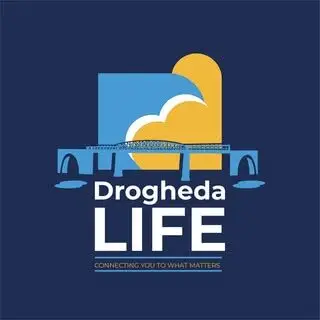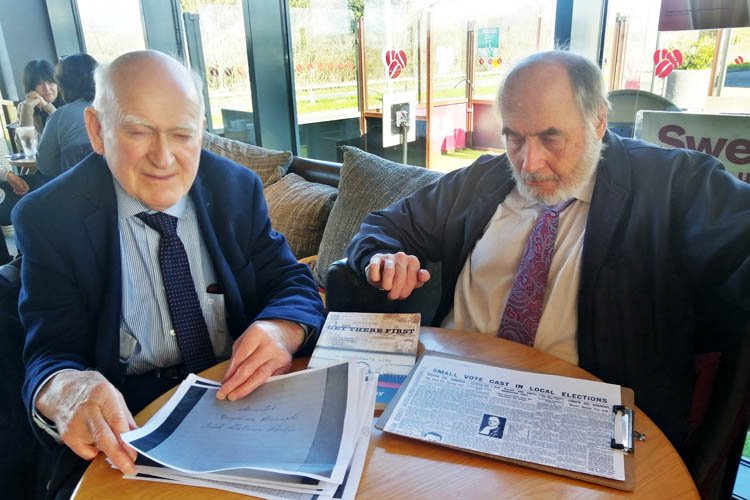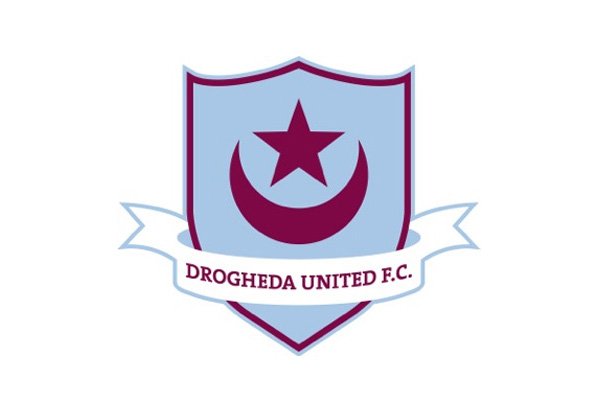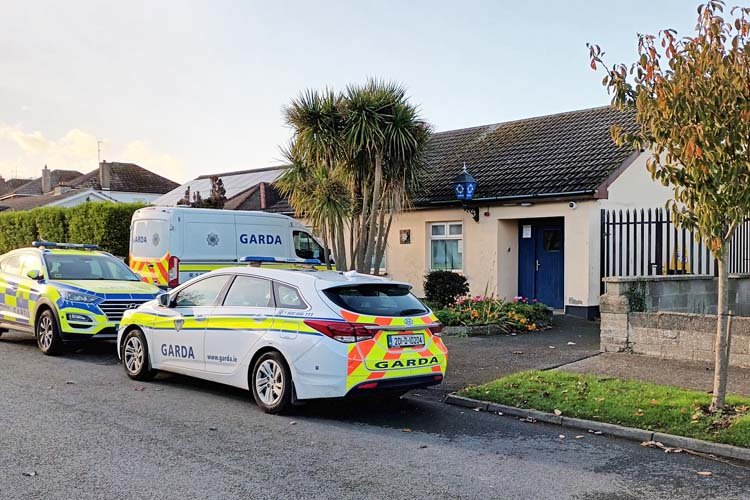By Paul Murphy
Today we publish an article by former Drogheda Independent Editor Paul Murphy which offers a rare slice of Labour Party and Trades Council history in Drogheda from 80 years ago which emerged through a generous gift made to the Irish Labour History Society.
Drogheda man Terry Corcoran, originally from Crushrod Avenue, son of Terry and Moira Corcoran, both Labour activists also prominently associated with the Old Drogheda Society, donated a minute book of the Drogheda Labour Party branch covering the period 6th September 1943 to 25th July 1949.
The minutes cover part of the period when Roddy Connolly, son of the 1916 leader James Connolly, was TD for Louth (June 1943-May 1944). Connolly served two terms as TD for Louth (the other ran from February 1948 to May 1951).
In this article Paul Murphy and Pat McDaid describe how they delved into the pages of the minute book after it was lodged with the Irish Labour History Museum at Beggars Bush in Dublin. Murphy’s father was chairman of the branch for some years and also served a term as a Drogheda Corporation councillor while Pat McDaid is a well-known psephologist which is not a rude word but means someone who studies elections and voting statistics.
Branch officers in September 1943 included Chairman James Murphy, Trinity Gardens, Treasurer Michael Connor, 22 Thomas Street, Secretary Joseph O’Byrne, 2 Magdalene Street, Vice-Chairman Patrick Cassidy, 6 Green Lanes; Committee Davy Blood, Sandyford Terrace, William Kierans, 19 Pitcher Hill, Charles O’Brien, Millmount Square, James Mulroy, 159 Hardmans Gardens, Peadar Martin, 4 Hand Street (later a Mayor of Drogheda), Thomas Leslie, Legavoureen Park, Patrick Matthews, Duke Street, Christopher Quigley, 3 Oulster Lane, Charles McDonnell, 9 Thomas Street.
In those first pages of the minute book it was recorded that meetings in future would be held monthly instead of weekly; that Seamus O’Farrell, national organiser, would be invited to the next meeting; and Tom Leslie spoke forcefully about working conditions at the local “fuel dumps” (described as “very bad” and lacking any facility to make tea, and without shelter). The secretary was instructed to write to Fuel Importers to complain.

Complaints were also made about the poor wages and bad working conditions endured by flax pullers in the area. Deputy Connolly recorded that he had investigated the matter at length but could not make progress because of the lack of regulations governing working conditions of female flax pullers.
A “turf war” between the two local papers was also noted. The Argus wrote to the Labour branch complaining that an advertisement about Labour meetings had been given to the Drogheda Independent but not to it. Mr William Kierans said that the branch should not support the Argus as it was “not a trade union shop”.
There were complaints too about the condition of the local library, described as “a dump of old rubbish with a heap of filthy old books, or rather remains of books which people would be loath to touch at all”.
The plight of an elderly woman who, through short-time working at her employment and illness, had fallen behind with her council rent and being threatened with eviction, was also raised.
The Department of Supplies replied to a branch complaint about rises in the price of milk in Louth. The branch view was that the people of Drogheda could only blame themselves because they failed to support the milk depots set up by the Government because of a threat by the “dairymen” to hold up supplies.
The minutes of a meeting in October 1943 indicated that the branch was very much “male and pale” because the national organiser expressed his surprise that there were no women present and prompted the branch towards organising a women’s section.
The minutes recorded “While Mr O’Farrell was speaking, three ladies arrived and listened to his address with great interest and appreciation. They were Mrs Quigley, Mrs Markey and Miss O’Byrne”.
The organiser said that when his party put forward proposals towards doing away with unemployment and distress among the workers and more generous treatment of widows, orphans and old age pensioners they were always met with the reply “there is no money” yet the Government was spending £10,000,000 a year on the army.
He drew attention to the huge sums of money spent on the First World War and the ongoing war [1939-45]. It seemed that money was only scarce when it was needed to improve the lot of the working man.
The milestones of life were also marked in the minutes. A Michael Kilmartin was congratulated on his recent marriage. The case of the woman who had fallen into rent arears with the council came up again with Mr Connor stating that he and Mr Blood had approached the County Manager but had received no definite reply. A decision was made to take up a collection in the area where the woman lived so that the rent arrears could be wiped out.
The question of whether both local newspapers should be invited to report on the Labour meetings came up once again. Labour members were assured by the local Typographical Society that the Argus WAS a trade union house and an invitation was sent to both papers to give coverage to the meetings.
The case of a Mrs Farrell of John’s Gate was raised at the meeting held on 1st November 1943. The meeting was told that Mr and Mrs Farrell and their four children were facing eviction from a “condemned” house. The meeting heard that they were in a desperate situation, that they had searched the town but could not find accommodation. The minutes said “People with rooms to let object to children so the prospect before this little family is tragic”. A motion condemning the eviction was passed.
Funding of the branch as a hot topic in 1943 and there were plans for a Christmas raffle organised by the South Louth Divisional Council. Another hot topic was the perceived reluctance on behalf of the local newspapers to give Labour any publicity. Tom Leslie proposed that they should go before the people through street corner meetings and he got unanimous support for this. He also proposed that women be admitted to the “men’s branch” and Mrs Quigley, Mrs Markey and Mrs Leslie were admitted.
Yet another hot topic emerged from the minutes. Hugh Crilly, General Secretary of the Irish Shoe and Leather Workers’ Union and later owner of the Black Bull Inn, drew attention to the fact that the price of footwear was fixed by the Government.
He said he had reason to believe that some of the shopkeepers were telling their customers that that the fixed price was the minimum price and that they were not allowed to sell under that price. This was definitely victimising the public and he would like to be informed of any shopkeeper who was doing this. Mr Crilly also told the members that those retailers who bought their footwear direct from the factory were allowed to charge 50% profit, that is to say, a shopkeeper paying £1 for a pair of boots at the factory is allowed to charge 30/= over the counter.”
In the same minutes it was recorded that Mr Louis Turley asked the secretary to write to Deputy Connolly asking him to obtain an extra tea ration for the shift workers of Cement Ltd.





